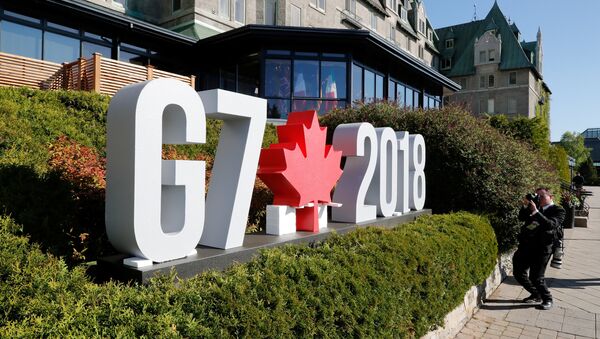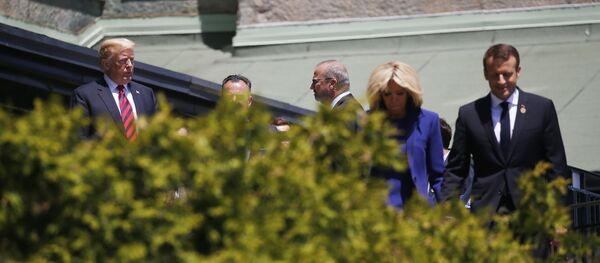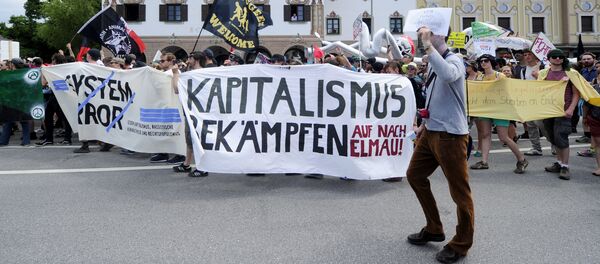Yet it could rise to more prominence during the group's future summits since resuming cooperation with Moscow has long been overdue and would make the format more relevant and balanced, experts told Sputnik.
Trump told reporters on Friday that the G7 states should allow Russia to rejoin the group as the two-day summit kicked off in Quebec. He said the G7 had a "world to run," and Russia should have a place at the negotiating table.
READ MORE: G7 Summit: Trump Trying to Prevent US From Losing 'Superpower' Status — Analyst
Italy's new Prime Minister Giuseppe Conte backed Trump, noting that the move would be "in everybody's interest."
Commenting on the US leader's remarks, Kremlin spokesman Dmitry Peskov said that Moscow was currently focused on other formats.
Earlier in the day, Russian President Vladimir Putin reiterated his readiness to engage in a dialogue, expressing hope that Trump would fulfill his pre-election promise to improve bilateral relations with Moscow.
The group of the seven most advanced economies — the United States, Germany, Japan, the United Kingdom, France, Italy and Canada — used to be called the G8 before Russia's membership was suspended in 2014 after the outbreak of the Ukrainian crisis.
Russia Could Return But Later
According to G7 Research Group Director John Kirton, the idea of Russia’s return to the group was untimely, yet could gain more tangible support and momentum within the next two years when France and the United States each rotate into the presidency of the group.
"No other G7 leader will agree that now is the time to have Russia return to the G7 in any way. The process could start as early next year, when French president Emmanuel Macron hosts the G7 summit, or more likely in 2020 when U.S. President Donald Trump himself is scheduled to host, should Russia's behavior change sufficiently by that time," the professor told Sputnik.
READ MORE: G7 Summit Highlights: Tusk Accuses Trump of Challenging 'International Order'
Kirton suggested that the ongoing G7 summit was likely to result in "several signature successes," such as a "strategy to prevent foreign interference in the elections of its members and other democratic polities around the world."
"I think that at this summit in Canada there may be not yet some special news about Russia, but I think step by step, maybe at the next summit, we will see the first results," Andrea Picchielli, a Lega party member, said.
Marco Zanni, a member of the European Parliament from Italy, echoed Picchielli's statement, noting that Trump's idea could be the first step to "break the ice."
"It is too early now to predict any return but I believe it was a good move to break the ice and brought up the discussion on the agenda," Zanni told Sputnik.
Motives Behind Move
According to Kirton, Trump’s unexpected proposal perfectly fit in with his love for "bold and historic suggestions," yet the expert also suggested that Trump thereby wanted to respond to Moscow’s signals of readiness for a dialogue and willingness to decrease military spending.
"First, because Trump is finally starting to focus on how to make the G7 work better and likes to make bold, spontaneous, historic suggestions of this sort, in the same way, he did in regard to North Korea denuclearization. Second, it may be that President Putin has offered Trump help in denuclearizing North Korea and Trump wishes to respond to encourage this trend. Third, it may even be a reward for Putin's post-election signal that he wishes to reduce Russia's military budget even while the United States massive increases its own military budget," he pointed out.
"The G8 would have a meaning and an absolutely greater importance with also the participation of Russia. Without Russia it loses value and does not have the same importance," the politician said.
EU parliament member Zanni said that Russia's presence could bring about more legitimacy and balance to the select group.
"Russia should be a strategic partner on many issues and could play an important role at the negotiation table, Moreover its presence and weight will give more legitimacy and balance to a format, which seems already overtaken by the growth in stature G20," he said.
The Reaction of the ‘G5'
Most of the experts voiced doubt that the majority of Trump’s partners, except for Italy, were ready to swiftly embrace his idea.
According to Zanni, there were no prerequisites for leading EU countries to change their positions; Berlin had maintained a tough line on Russia, despite its long-time special relations with the latter, while the United Kingdom has plunged even deeper into its opposition to normalizing relations with Moscow.
"Germany and the UK are against for different reasons. Germany has always kept a special relationship with Russia based on official and unofficial channels of dialogue and business. However, things are changing, as shown by the recent declarations of the new German foreign minister, which provoked a debate in the country and between the parties of the coalition government. While the UK, on the other hand, has never had simple relations with Russia and things plunged further after the Skripal affair," he said.
Richard Wood, a member of the UK Independence Party (UKIP), in turn, suggested that neither Berlin nor London were interested in having Putin at the negotiating table since Moscow could then point to some of the G7 countries’ fallacious policies.
"Mrs. [UK Prime Minister Theresa] May has no backbone at all and would be likely to sit on the fence or indeed find another problem to blame Mr. Putin for and, as the Germans control the EU, I can't see them wanting Mr. Putin at the table as he is the world’s finest leader and the G7 would be held to account by Mr. Putin," Wood told Sputnik.
Picchielli, in contrast, suggested that London and Berlin could review their stances in the light of the US proposal.
"I know that the position of the UK and Germany are against it, but I think that the Foreign Minister of the United Kingdom Boris Johnson will go on with the position of the United States because the UK is too much linked to the US not to stay in the same position. Just [German Chancellor] Angela Merkel can have more her position, but also for German economy I think it is the best option that Russia comes back to G8," Picchielli argued.
While Merkel has said that she sees no prerequisites for Russia’s return to the format, the right-wing Alternative for Germany (AfD) party has expressed its full support for the move.
"I consider the return of Russia to G8 as a 'must'. Excluding one of the world's most important nations from such a summit makes its result — if any — automatically less valuable. I therefore fully support the position taken by the Italian Prime Minister Giuseppe Conte: Russia's participation clearly is in the world's best interest!" Roland Hartwig, the vice chairman of the AfD parliamentary faction, told Sputnik
According to the politician, Merkel's stance was a clear example of double standards and "jeopardizes Germany's credibility in the world."
"Unfortunately Mrs. Merkel has taken a strong position against Russia returning to the G8. With that, she continues to jeopardize Germany's credibility in the world. Taking such a harsh stance towards Russia allegedly justified by Russia violating international law on the Crimea and remaining completely silent when it comes to Turkey's illegal invasion in Syria in January and even supporting the illegal air attack by the US, the UK and France on Syria in April as ‘necessary and appropriate’ clearly demonstrates the different standards applied by the German Chancellor," he said, expressing hope that such a position would be overruled by other political leaders sooner or later and Russia would be invited to future summits.
Rome Embraces Idea Yet Wonders Whether Russia Wants It
Ferrari noted that Trump’s idea was in line with the new Italian government's stance on Russia, as well as its calls for lifting anti-Russia sanctions and reinstating Moscow as a strategic partner.
"The problem is not the position of Canada, Germany or Great Britain. But the question is: does Russia want to be part of a group of states that has mistreated it and has unjustly sanctioned it for all these years? Obviously, it is up to the Russians and President Putin to respond. We, as Italians, would be happy to have our Russian friends back at the G8 table, all in peace and harmony. It would benefit the whole of humanity. The positions of the other states mentioned struggle to understand it," the Lega member said.
"The wind has changed. And it has also changed thanks to the new Italian government. And now, what justice is done. And it is recognized to Russia and its people the errors that the European governments have committed in these years toward them. I hope we can return to an atmosphere of serenity and collaboration. The enemy is Islamic terrorism. And not Russia. Indeed, Russia is a formidable strategic, economic and cultural partner. We cross our fingers and hope that this crazy policy against Russia is finally over," he said.
He also voiced confidence that Rome could pioneer such efforts.
The views and opinions expressed by the contributors do not necessarily reflect those of Sputnik.






